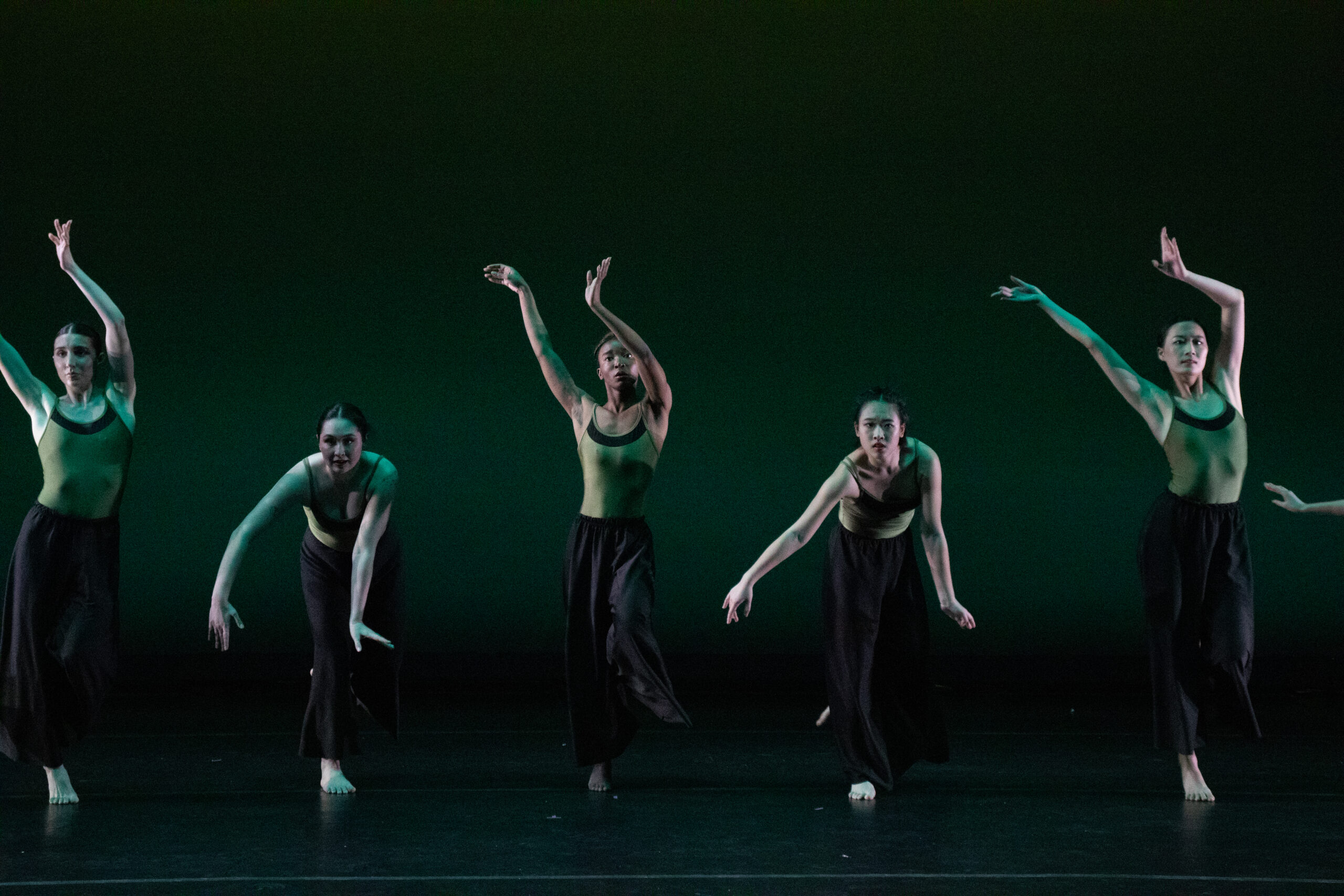A group of dancers work to perfect their formations, counting alongside the music from a small speaker in the corner. After moving through synchronized hits and carefully choreographed transitions for hours, the students wrap for the night. Despite what the sweat and empty water bottles might suggest, they never actually entered the studio. Instead they were relegated to a small hallway in the HFSC as one of 17 performing arts groups fighting for three dance studios.
This is a familiar story for Marina Mitrinovic (SFS ’26), co-president of Georgetown’s Korean-pop dance group Vibe. The group, who films cover dances and participates in showcases, has run into repeated challenges reserving studio space.
With only two dance studios on campus and the new addition of a small exercise room in Byrnes Hall, groups in need of space often take what they can get. For Vibe, this means holding rehearsals at less-than ideal times, including 10 p.m. to midnight on Thursdays and 7 p.m. to 9 p.m. on weekends. Other times it means not rehearsing in a studio at all; Mitrinovic recounted a rehearsal Vibe held in the Vil A common room at night, using the windows as a makeshift mirror.
“We couldn’t find anywhere else,” Mitrinovic said. “We’ve been talking in this club for so long, being like, ‘We need more space.’”
A student referendum, which will be up for a vote Oct. 22-Oct. 24, aims to change the lack of rehearsal space on campus. The struggles groups like Vibe face inspired GUSA Sen. Tina Solki (SFS ’26) to introduce the Securing the Arts in Georgetown’s Expansion, or STAGE Act, onto the ballot this election cycle. The referendum, if passed and accepted by the university, would require the university to explicitly commit to including performing arts spaces in future campus development, as well as increased consideration of already existing spaces in future renovations.
While at a Rangila dance practice, Solki recalled talking with a friend about the lack of adequate rehearsal spaces on campus. As she joined dozens of dancers squeezing into ICC classrooms without mirrors, she concluded that a referendum could be the first step in solving the problem.
“I think that my mindset going into this then was that there had to be some kind of way to expand the pie, and to make sure that we were continually expanding that pie,” Solki said.
There are multiple rooms on campus that can be rearranged to accommodate a dance rehearsal, such as White-Gravenor 201 and 202. As the referendum took shape however, she landed on legislation that would provide a promise by the university to consider performing arts spaces in future renovations and campus developments.
After a positive campus reception to GUSA’s Arts Week, Solki emphasized the need to expand opportunities for arts-oriented communities.
“The same way that we have a lot of club sport teams that are walk-on, it’s important to be able to do what you love, surrounded by other people in a consistent team-like collegial manner,” Solki said. “It’s important to have a place and a space where you feel like you belong.”
Nathan Brown (CAS ’28) founder of Hoya Break Squad, said he wants to do exactly that with his dance group.
“Our mission is to create a place for break dancing, specifically and more broadly freestyle, hip hop dance,” Brown said.
While Brown applied to establish his club with the university in Fall 2025, the group’s university affiliation is pending. Finding spaces on campus to rehearse poses an additional burden for new dance clubs that are yet to be approved by the Performing Arts Advisory Council (PAAC), like Hoya Break Squad. These clubs are not permitted to book rehearsal spaces on campus in advance or access Georgetown’s designated club funding.
Brown said that the limited dance spaces have been challenging with growing membership.
“We’ve been getting new members and it would be so much more if we could actually book rooms instead of just using them when no one else is,” Brown said.
Brown hosts weekly “ciphers,” or open rehearsals, that require large rehearsal spaces for collaboration and mentorship from experienced dancers.
“B-boy culture is all about learning and teaching one another, passing it down,” Brown said. “So those are our opportunities where we like you to give the knowledge you have and take the knowledge that others are willing to give.”
Without the ability to book rehearsal locations, the group has been practicing in less than ideal spaces, such as hallways, Yates, and even outside in Red Square or the Harbin patio.
“We have to make do with what we have. It’s been very tough to host and plan practices when all of your invites have this asterisk next to the location that’s subject to change,” Brown said. “Even if we end up getting in, you have to put an asterisk because, if you say it’s the actual location and then someone books it, there’s nothing you can do. You have no legitimate claim to that room.”
Brown said that his aspiration for Hoya Break Squad is that they book spaces in advance to host choreography rehearsals for their annual showcase and events for the broader D.C.-area break dancing community.
Brown supports the referendum’s effort to expand rehearsal spaces on campus to ensure that every student has the opportunity to engage in the arts.
“I think the community for the arts at Georgetown has so much potential to grow if we have the administration on our side helping us,” Brown said. “Some form of artistic expression is fundamental. A referendum supporting that and making that more accessible to our community would benefit everybody, not just us or the dance groups or the art groups.”
Including Hoya Break Squad, there are four dance groups that are awaiting PAAC’s approval or denial of their new club application. PAAC Chair Yunji Yun (CAS ’26) said that the limited space has contributed to this backlog. She explained that it has been challenging to fairly divide the limited rehearsal spaces and two official theaters on campus among its 19 clubs, including two that are in the new club development process.
“Our biggest thing every year is finding the right practice and performance space for any performing arts group,” Yun said. “That’s what stopped us from being able to accept a lot of new groups.”
PAAC is one of the eight signatories on the referendum, demonstrating that they recognize the limitations placed on performing arts groups when rehearsal spaces are limited.
“It would be really beneficial to have more recognition from the student body and from the university that the performing arts spaces on campus are limited compared to the students that are interested in it,” Yun said. “With the growing interest, especially post-COVID, a little more attention to upkeeping and potentially thinking about future expansions would be great.”
The Georgetown University Dance Company (GUDC) have attested to this interest. Assistant Student Artistic Director Kyra Masone (SON ’26) and Co-Production Director Zoe Frantz (CAS ’26) explained that both GUDC and Black Movements Dance Theatre have seen growing interests for dance since their freshman year.
Because of space constraints, however, GUDC took only six of 37 auditionees this cycle.
“It’s unfortunate that we have to limit the size, because that also means we’re just getting people out of dancing,” Frantz said.
While GUDC’s status under the Department of Performing Arts has allowed them to reserve HFSC’s Studio A with more ease, Masone and Frantz expressed challenges the club faces in scheduling shows with a limited number of areas to perform on campus.
“The dance program is so small, even within the performing arts department, so our performance schedules are based around [the theater program],” Frantz said. “We can’t necessarily get the time we want.”
One way to grow the dance program, Frantz suggested, is to have a larger studio space. With 22 members in the company, GUDC had to split up auditions into different rooms.
“There is that big hallway in HFSC by Studio B, it’s just a huge wide hallway,” Frantz said. “We just imagine like an extra five feet in that studio would be, like, so much better.”
Masone added that if there were more, larger studios, dance classes could increase in capacity and variety. As more class section slots for dance courses have been added to respond to increased interest, Masone believes this interest could translate into growth for the program.
“I think if there was more space and you could allow more faculty to join, we could have a way bigger dance program that actually counts for credit, because people are interested in it,” Masone said.
If space allowed, GUDC would expand membership. But outside of the company, Masone and Frantz hope the referendum adds opportunities for interested students to simply do what they love.
“If we had a bigger studio, we could have more people dancing,” Masone said, “which is the whole point.”
Mask and Bauble, the oldest student theater group on campus, has also advocated for the referendum. Cliff Stern (CAS ’26), executive producer of Mask and Bauble, said that they made the decision to sign on with the performing arts community as a whole in mind.
“There’s a lot of overlap within the performing arts community, both within the different theater clubs and then also with a capella, with dance, with pretty much every performing arts under the sun,” Stern said. “We are super excited about the ability to just facilitate more performing arts on campus. More theater, more performing arts is always better.”
While the group is lucky to have their own theater to rehearse in, they have experienced complications with reserving spaces when they need to hold two rehearsals simultaneously to accomplish what they need to with condensed timelines.
“We’d be really excited about having more performing arts space on campus, and easier access to it,” Stern said. It would be awesome both to facilitate new dance groups on campus and emerging groups so that they could have their rehearsal space, but also more like ad hoc available spaces for us and for other theater groups.”
Like many of his performing arts peers, Stern said that the arts have been core to his time at Georgetown, having joined Mask and Bauble his freshman fall. He hopes this referendum facilitates opportunities for more Georgetown students to get involved with the arts.
“The pre-professional nature of Georgetown and the club culture can be very exhausting,” Stern said. “But the arts are such an important part of the liberal arts education and the liberal arts tradition that Georgetown has. We’re so excited to support this referendum to ensure that the Performing arts at Georgetown and the arts in general can continue to flourish.”
The STAGE Act, alongside the Restore Student Life Act, will be open to voting starting at 8 p.m. on Oct. 22 through 8 p.m. on Oct. 26. The referendums join voting for both GUSA Executive and GUSA Senate seats.
Editor’s note: Tina Solki is a member of the Voice’s editorial board and previously served as the newsmagazine’s design editor. Yunji Yun is the Voice’s photo editor.





